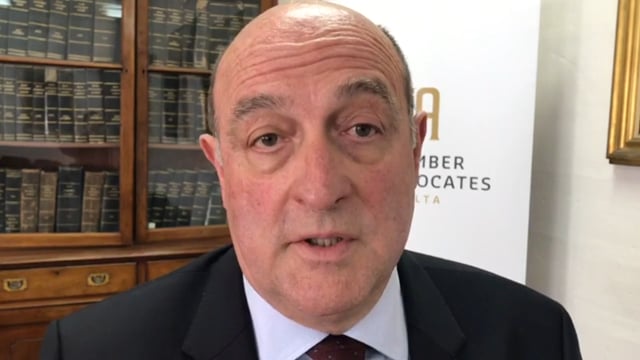[WATCH] Judges who cleared two convicted graduates for their legal warrant made a ‘mistake’ – Chamber of Advocates
The Chamber of Advocates is insisting that a conditional discharge is still a criminal conviction that bars candidates from obtaining a warrant to practice as lawyers


Judges who cleared two law graduates for their warrant were “mistaken” when they failed to take into consideration a criminal conviction against them, the Chamber of Advocates said.
In an uncharacteristic move, the Chamber this morning held a press conference in which it denounced a statement released on Thursday by the Association of Judges and Magistrates.
The case revolves around two law graduates who took the exam to obtain their legal in January this year.
It transpired that the two, Yanica Barbara, 28, of Attard, and Thomas Sant, 30, of Qormi, had been given a conditional discharge in 2009 and 2010, respectively after admitting to fraudulently using a lost credit card.

After sitting for the written exam on 4 January, the two appeared in front of a panel of judges for the oral exam. The judges cleared the two candidates, who presented a clean police conduct.
Barbara and Sant were then formally invited to obtain their warrant in the ceremony that will be held on 12 March. The case was flagged by the Times of Malta earlier this week.
Controversy ensued and the Association of Judges and Magistrates, in another uncharacteristic move, released a statement defending the actions of the judges on the respective panels.
The association said the candidates had been handed down a conditional discharge, which in itself did not disqualify them from obtaining a warrant.
However, Chamber of Advocates president George Hyzler insisted the sentence meted out by the courts was irrelevant because the two candidates had admitted the charges and were found guilty.
Hyzler said the interpretation of conditional discharge by the judges was wrong.
“The two candidates admitted the charges and were found guilty. The court just decided to suspend judgment but they were guilty of crime and this prohibits a person from obtaining a warrant,” Hyzler said.
He explained that a police conduct certificate was not enough to ascertain whether a person had a criminal conviction.
Hyzler said the Chamber had received information on 4 January about the two candidates and wrote to the Chief Justice on 8 January.
“In the two letters – one for each candidate – the Chamber informed the Chief Justice of the criminal convictions against the two candidates and attached the respective court sentences. The Chamber asked the Chief Justice to forward the letters to the panel of judges that were to conduct the oral exams in the weeks that followed,” Hyzler explained.
Hyzler said he could not say whether the Chief Justice did forward the letters to the panel of judges but from the statement made by the Association of Judges and Magistrates, it appeared that they had been made aware of the cases.
On 5 February, after the judges cleared the candidates, the Chamber wrote to the President informing her that the two candidates could not obtain their warrant because of the criminal convictions against them. The letter was also copied to the Justice Minister.
Subsequently, the Justice Ministry withdrew the invitation to Barbara and Sant, to the warrant-awarding ceremony.
Hyzler said it was not out of this world for judges to make a mistake but the Chamber was miffed by the statement that failed to acknowledge the mistake or at least justify it correctly.
“Had the association said that the judges were aware of the convictions but still felt the two candidates were of good moral character to obtain their warrant, one may argue the case but the statement justified the decision on the wrong premise that the two had a clean police conduct and a conditional discharge was not a conviction,” Hyzler said.
He admitted that the system to screen prospective lawyers was not fool proof but insisted it would be wrong to go by the police conduct alone when other proof had emerged.
The Chamber has suggested that candidates applying for a warrant make a sworn declaration that they never had a criminal conviction, which would put the onus on them. If it transpires that candidates lied, action would be taken against them for taking a false oath.
Hyzler said there were students in the past who failed the warrant exam because of criminal convictions.
He said the Chamber wanted to protect the reputation of the profession and the interests of the ordinary citizens, who had to have trust in members of the legal profession.
“The bottom line is that the board that examined these two students made a mistake and it should have had the courage to admit so,” Hyzler said.






.jpg)













.jpeg)

